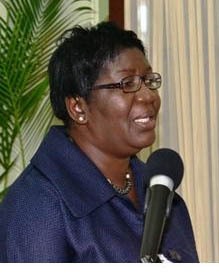Minister of Natural Re-sources and the Environment Robert Persaud says drafting and implementing a new National Bio-Safety policy is vital to sustaining and safeguarding Guyana’s biodiversity wealth.
He was speaking at the first stakeholders consultation held on Wednesday.
According to a Govern-ment Information Agency (GINA) report, consultations started after Persaud mandated the Environmental Protection Agency (EPA) to work with stakeholders to refine; formulate and propose for implementation the draft 2005 National Bio-Safety policy in six months.

Speaking at Wednesday’s session, Persaud said government has recognised the need to safeguard Guyana’s biodiversity wealth and has sought to do so through strategies such as the 2005 draft policy, the National Development Strategy, the Poverty Reduction Strategy, and more recently the Low Carbon Development Strategy.
“Each strategy has addressed how to pursue, conserve and sustain the use of the country’s bio-diversity,” he said. Therefore, in moving forward in this regard more aggressive steps must be taken to update the 2005 draft policy.
“Increasingly the relevance of bio-technology and bio-safety issues will come to the fore, and critics may say that we are a bit behind, and yes we are a bit behind, and that is why we have to act with some level of urgency, in terms of refining and finalising our policy, but also very quickly in developing the legislative framework,” the minister said.
Persaud told the gathering that the activities that foster Guyana’s economic security depend on the framework being revamped to allow the nation to use its natural resources sustainably and to conserve them.
“If we ignore the framework which allows us to conserve as well as to [sustainably utilise these] resources and we do not recognise the threats as well as the opportunity associated therein, we can find ourselves under severe social and economic circumstances,” he said.
The minister also called for greater coordination among all stakeholders agencies in reviewing the policy.
“Some of the activities that relate to bio-safety and bio-technology reside in the health sector, the agricultural sector, some within the extractive industry sector and others within the environmental sector, so we have the issues there and we have different perspective residing in different agencies …if we are going to overcome and move as quickly as we ought to we need to bring all of this together and we do hope through the consultations and interactions, we will come up with a model that will allow us to manage these issues in a way that is good for Guyana but also allows us to [fulfil] our national obligations, as well as our international obligations,” he said.
Persaud also proposed that the model must provide for greater public sensitisation and awareness of the issue of bio-technology impact, and also the monitoring and enforcement of the policy.
According to Project Coordinator Jennifer Bentick, in 1994 Guyana signed on to the United Nations Convention on Biological Diversity (UNCBD) out of which in 2000, a supplementary agreement; the Cartagena Protocol on Bio-Safety was adopted which advocated for the protection of biodiversity against the potential risk of living organisms.
In fulfilling this obligation, Guyana had developed a National Bio-safety Framework, she said. Guyana is now in the preparatory stage of this framework that comprises a national and a regional component. The latter component supports the establishment of the legal and institutional framework.
Guyana is among 11 other Caribbean countries, seeking to implement the National Bio-safety Framework, GINA said.




